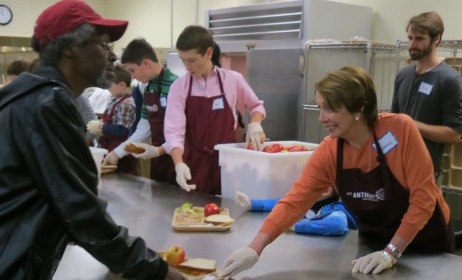
Office of the Speaker
Speaker Pelosi (seen serving serves meals at the Thanksgiving holiday) introduced a bill this week that would expand access to the PPP to all nonprofits of all sizes and that would dedicate 25 percent of PPP funding to nonprofits.The American people are suffering through what could be the most significant downturn since the Great Depression. Despite this, they are supporting fundraisers for their favorite local restaurants, giving to charitable organizations like the one in New York City that I run, and even are promising to #PledgeMyStimulus to families in need.
Like the staff at my local bistro, I am grateful. These donations mean that nonprofits can offer one more meal, house one more soul, or provide mental health support to someone in need.
Also like the staff at my local bistro, I know that these generous contributions will not be enough. This crisis is simply overwhelming. We will need significant additional help from the federal government to survive.
Thousands of small businesses have benefited from the U.S. Small Business Administration’s Paycheck Protection Program (PPP). There have been glitches, for sure, but the agency has provided a lifeline.
Now Congress has an opportunity to expand the PPP to America’s larger nonprofits, which also are trying to feed, clothe, and house Americans. The Health and Economic Recovery Omnibus Emergency Solutions (HEROES) Act introduced by Speaker Nancy Pelosi (D-Calif.) this week includes provisions that would expand access to the PPP to all nonprofits of all sizes and that would dedicate 25 percent of PPP funding to nonprofits.
Members of Congress should make sure these provisions are in the next coronavirus spending bill.
With decades of experience, large nonprofits are some of the best equipped organizations to expand and deliver the types of social services Americans need today. CAMBA, for example, always has gone where we are needed. In New York City, we were one of the first organizations on the ground trying to tackle the AIDS crisis. I am proud that we have grown to become the largest nonprofit employer in Brooklyn by identifying our communities’ emerging needs and quickly scaling programs to tackle those problems.
We continue to do that in the middle of the pandemic. In fact, we estimate we will need to hire about 500 more employees to meet current needs. We will have to scale up despite expected cuts from city and state governments.
Our story is not unique, which is why large nonprofits need access to the forgivable loans offered through the PPP.
The HEROES Act also would require the Federal Reserve’s Main Street Lending Program (MSLP) to include nonprofits and the bill also would ensure these organizations a low-cost loan option tailored to their unique needs.
 CityViews are readers’ opinions, not those of City Limits. Add your voice today!
CityViews are readers’ opinions, not those of City Limits. Add your voice today!
We were deeply disappointed in April when the Federal Reserve announced nonprofits would not be eligible for the MSLP. While the Fed said it recognized “the critical role that nonprofit organizations play throughout the economy and is evaluating a separate approach to meet their unique needs,” its omission, we believe, went against Congress’s intent.
That is why, in the next coronavirus bill, federal lawmakers also should make it absolutely clear they wanted nonprofits to be part of the MSLP. And then, when finalizing its MSLP term sheets, the Fed should offer large nonprofits a zero percent interest rate at a five-year amortization, ensuring payments are not due until two years after a direct loan is made. The Fed also should allow nonprofits maximum flexibility regarding the labor and collective bargaining-related certifications outlined for the program.
These provisions will ensure nonprofit organizations can continue to provide services during and after the crisis. The HEROES Act will help keep American nonprofits financially strong, allowing us to continue to meet the immediate needs of our communities while regaining our strength for the future.
Nonprofit organizations are our country’s only institutions solely focused on strengthening communities. We appreciate that Congress recognized nonprofits in the CARES Act through charitable giving incentive measures, but it is not enough. Large nonprofits across the country are rising to the challenge and will be picking up the pieces for months, even years, after the curve flattens and falls.
Our unique needs should not be overlooked.
Joanne M. Oplustil is President and CEO of CAMBA and CAMBA Housing Ventures, a New York Citywide nonprofit social services provider and affordable housing developer based in Brooklyn. City and State NY named Oplustil to the 2018 and 2019 Brooklyn Power 100 lists.









2 thoughts on “Opinion: NYC’s Nonprofits Need Help from Congress, the Fed”
I am For Four Penny Surcharge on every Tax Paying Household to finance and fund all non-religiously affiliated nonprofit!
Who needs a loan when your CEO makes multitudes of millions each year (for a non profit). Don’t believe me look it up. She’s been raping the communities of BK for years by providing subpar work standards, mediocre programming all while she rakes in more dollars thru grantwriting and attacking NYC’s most vulnerable populations. Stop looking for money off the backs of the poor.